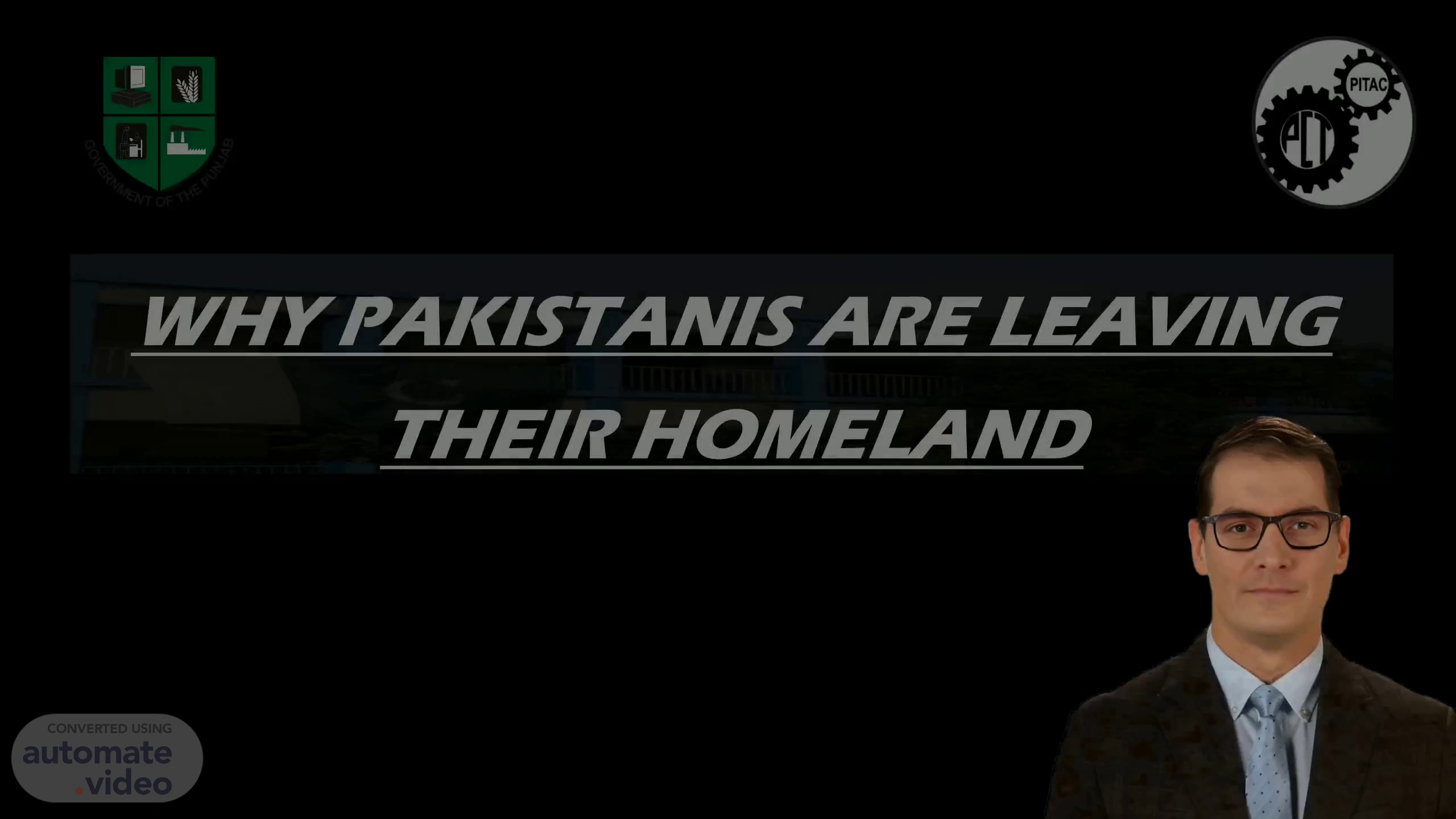
PowerPoint Presentation
Scene 1 (0s)
[Virtual Presenter] Good morning everyone. I am here today to discuss the current state of employment, economic crisis, inflation and currency devaluation, and poor living standards in Pakistan that result in many of its citizens choosing to leave their homeland. We have seen this issue affect large swaths of the country, and I am here today to present the research conducted by the Pakistan Industrial Technical Assistance Center & College of Technology. Through their work, we will be able to identify the problems and create tangible solutions to help create a brighter future for Pakistan..
Scene 2 (36s)
[Audio] Many Pakistanis are forced to leave their homes due to the tough economic situation in the nation. The primary reason for this is the lack of economic opportunities and inadequate technological advancement. To combat this, investment in technology and infrastructure, as well as education, is necessary. This will increase the number of job opportunities and further digitalize the economy, fostering growth of small businesses and more economic opportunities for the people of the country..
Scene 3 (1m 8s)
[Audio] As seen in the slide, a major cause for the exodus of people from Pakistan in 2023 is the dwindling of talent and littrate citizens. This is particularly worrisome because it implies the loss of human capital, an extremely valuable resource incorporating knowledge, skills and experience. This in turn is leading to fewer economic opportunities and a stunted development of technology in the country, which is pushing many people to leave their homeland..
Scene 4 (1m 37s)
[Audio] Many Pakistanis have had no other option than to leave their homeland in search of a better life due to the lack of economic prospects, technological progress, and the frequent variations in the economic conditions that contribute to soaring unemployment rates, grave currency devaluation, oppressive inflation, and a general decline in the quality of life. All of this has led to a growing number of Pakistanis seeking a brighter future elsewhere. The facts are clear..
Scene 5 (2m 5s)
[Audio] The economic situation in Pakistan is a challenge, with an unemployment rate of 6.3%, revised to 6.2% in the last decade. This is a significant problem for Pakistani citizens, who are forced to leave their country because of limited economic prospects and technological progress..
Scene 6 (2m 25s)
[Audio] The economic crisis in Pakistan shows no signs of improvement, leaving citizens with limited alternatives unless they decide to leave their country. This crisis has been caused by various complications, including excessive borrowing, fiscal deficits, limited energy resources for industrial sectors, and failure to collect taxes properly. Such conditions are unfavourable for economic development, leaving many Pakistanis with a hard choice of staying or leaving..
Scene 7 (2m 54s)
[Audio] Inflation has been a persistent issue that Pakistanis have had to confront. The increasing cost of living has led many to seek better prospects outside of their homeland. This is mainly due to food prices going up, energy costs rising, and disrupted supply chains that augment the costs of imports. Furthermore, there is a lack of economic opportunities with a slow pace of technological growth, which has impelled thousands of Pakistanis to seek opportunities abroad..
Scene 8 (3m 26s)
[Audio] Pakistan is facing tough economic times. Its currency has experienced a devaluation of 30%, causing inflation to rise and debt from International Monetary Fund (IMF) to accumulate. As a result, many Pakistanis have chosen to leave their homeland to pursue economic chances and better access to technology abroad. This is a critical problem confronting Pakistanis and should be addressed promptly to ensure a brighter future for the country..
Scene 9 (3m 57s)
[Audio] The facts in this slide make it clear that poverty is a major problem in Pakistan - one that affects a significant portion of the population. Although Pakistan ranks 161 out of 192 countries in terms of poverty, millions of Pakistanis find themselves unable to access even the basic necessities of life due to insufficient income. This lack of economic opportunities and technological advancement has led to many leaving their homeland and finding a better future elsewhere..
Scene 10 (4m 28s)
[Audio] Pakistan has historically been marred with displaced people, with more than a million having abandoned their homeland seeking a more prosperous life for them and their families. The main source of this exodus of people is due to the lack of economic opportunities and technological developments in Pakistan. Solutions to this would be aiding those pursuing economic success abroad, providing more safety to those exposed to political turbulence, and enhancing educational opportunities to those seeking a more higher standard of living..
Scene 11 (4m 59s)
[Audio] Poverty and lack of economic opportunities in Pakistan is a stark truth. Research from the World Bank shows that nearly a quarter of the Pakistani population lives below the poverty line. In 2020, the unemployment rate stood at 8.8%. These figures sound the alarm for urgent action to be taken. The declining value of Pakistani rupee has had a grave impact on the economy, forcing many citizens to leave their homeland for a more viable economic future elsewhere. It is our moral obligation to provide the necessary platform for Pakistanis to build a better life for themselves..
Scene 12 (5m 40s)
[Audio] Lack of economic opportunities and technological advancement are major factors leading to a troubling issue faced by many Pakistanis: the desire to leave the country. We have a responsibility to ensure that everyone in Pakistan has the same access to opportunity and resources, so that they can have the means to build a better future. Quaid-e-Azam Muhammad Ali Jinnah's words are especially relevant here: with faith and selfless devotion, nothing is impossible. We must strive to provide equal opportunities to all and do our best to create a brighter future..